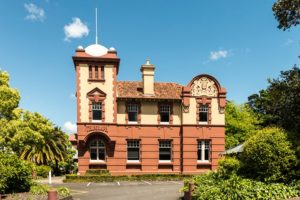1856: The Local Posts Act
May 11, 2020
By AHNZ
 The State has a long standing interest in controlling our postal system throughout history. Apart from the revenue gained by capturing this means of taxing communications, The State was also seizing a presence in the social life of people.
The State has a long standing interest in controlling our postal system throughout history. Apart from the revenue gained by capturing this means of taxing communications, The State was also seizing a presence in the social life of people.
The Local Posts Act of 1856 allowed Provincial Governments to set up Post Offices, mail services and communications systems with the national Government providing the Chief Post Office in each Province and backbone communications between provinces¹. Initially shabby and poorly kept (eg. Port Nicholson/Wellington) they grew in importance as The State grew in power.
“Mr. Howard, the gentleman who has been appointed Postmaster to this place, arrived in the “Mary,” from Nelson last Friday, and. has entered upon the duties of his office. This appointment has given great offence to the Canterbury colonists.”
“As soon as we arrived, the appointment of a Postmaster became necessary ; the Resident Magistrate recommended to his Excellency one of the first body of colonists, who was in every way qualified for the office. This recommendation was passed over, and the Postmaster at Nelson was appointed to our settlement.”
“In all the English colonies, from the first establishment of Virginia to the present hour, the most unfailing source of discontent, fretfulness, and hostility to Government has been this; that the colonists whose enterprise, energy, skill, and capital have been devoted to rearing up their new community, have been deprived of the privilege of working their own system, in their own way ; and have seen every place of power, profit, or emolument under the Government, given to strangers, who, having no stake in the colony, have no sympathy with its founders, and are comparatively indifferent to its success.” – Lyttelton Times, 10 May 1851; Papers Past
Canterbury’s true first Postmaster was Michael Burke (December 1850,) appointed by John Godley himself. Central Government (Governor George Grey) overrode the much desired local autonomy of the Canterbury Pilgrims, assigning an outsider to handle their mail named William Howard. Yet, in a little postal service civil war, Canterbury’s man, by now Charles Bishop, remained in trade. The Canterbury Provincial Council appointed Bishop official postmaster in 1854. It appears both Howard (from Lyttleton) and Bishop (Christchurch) were operating at the same time, dueling it out. Canterbury’s first milestones were laid starting at the door to Bishop’s Post Office and General store, helping to cement his hegemony. The 1856 Act probably settled and was prompted by such disputes.
By taking over the postal system and giving itself the power to abolish competition The Sate now had a branch office in every town and village. There was once a time when the only interaction with The State a person had was a visit to the Post Office; It was essential for them to get their foot into the door of our private business.
Post Offices have always been a hub of New Zealand life and our social interactions. These things are too important, determined the Government, to go unsupervised.
—
1 Awarua Communications Museum
Image ref. Post Office in Clarence, Tauranga; NZPlaces; Facebook
The Local Posts Act became law on 15 August, 1856
Ref. p33 Victoria Square, Rice (2014)
Ref. Charles Wellington Bishop, DISCO (2020); Facebook
Ref. Michael John Burke of Burke’s Pass fame, DISCO (2019); Facebook
Ref. also 1815: New Zealand’s Mail
 Like Comment Share
Like Comment Share





